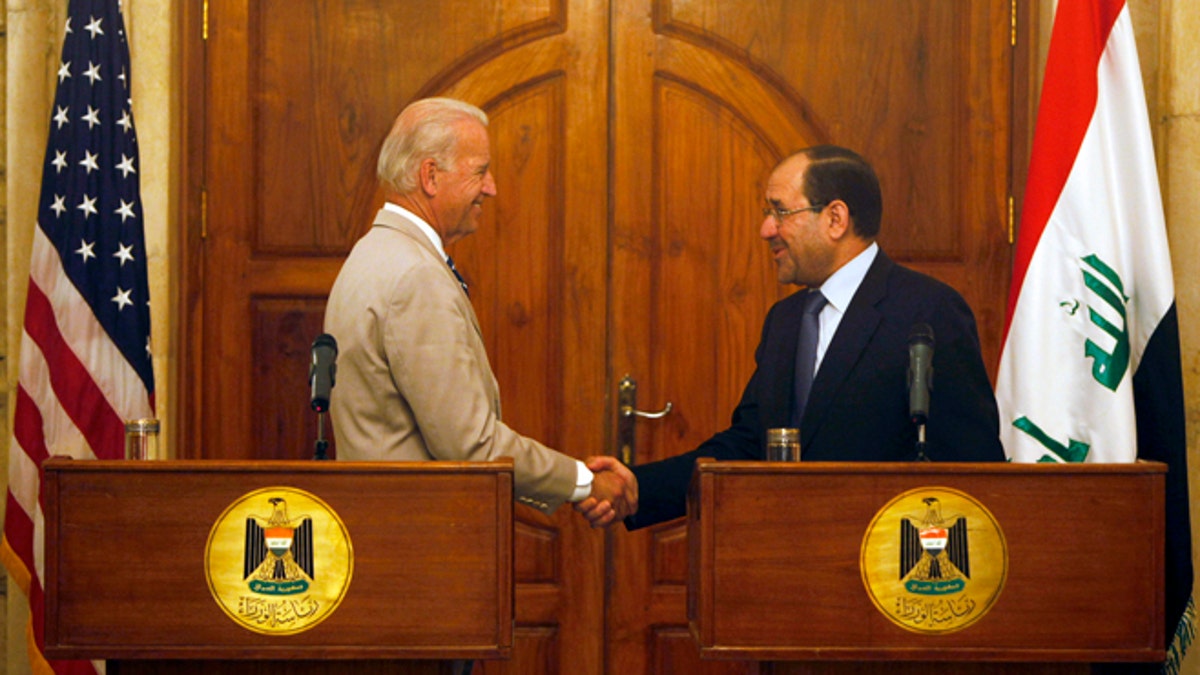
U.S. Vice President Joseph Biden and Iraqi Prime Minister Nuri al-Maliki (R) shake hands in Baghdad July 3, 2009. (Reuters)
Whenever there’s a tragedy like the typhoon disaster in the Philippines, heroic efforts follow, as they should. But there has been little note of a heroic effort halfway around the world, in a small refugee encampment on the outskirts of Baghdad. But it deserves our attention – and some action.
For more than three months, hundreds of Iranian dissidents have been on a hunger strike in protest of the kidnapping of seven of their compatriots, six of them women, after the murder of more than 50 others in a brutal, unprovoked massacre by, or with the complicity of, the Iraqi security forces.
These hunger strikers, who have subsisted on only water since the attack on Camp Ashraf on September 1, and whose health is fading every day, want only one thing: attention and action on an injustice.
They want the world to realize what is being done by the Iraqi Prime Minister Nouri al-Maliki, clearly at the behest of his masters in Tehran, to help wipe out any opposition to the mullahs who control Iran.
[pullquote]
The story begins two years ago when U.S. troops pulled out of Iraq, at Maliki’s insistence.
Among the things left behind was the security of more than 3,000 members of the Mujahedin-e Khalq (MeK), which had been promised by the United States. When the folks at Ashraf turned over their weapons after the fall of Saddam Hussein, they were guaranteed protection under the 4th Geneva Convention. The U.S.-led coalition forces vetted every single one of them before offering that protection.
But rather than continuing this protection, the Maliki government has violated its pledge to do so, with deadly effect.
Attacks in 2009 and 2011 on Ashraf took dozens of lives before Maliki ordered the camp disbanded and its residents scattered around the country or returned to Iran, where they’d face certain death. The U.S. and U.N. intervened and got Maliki to agree to transfer all but about 100 of them to an abandoned US base near Baghdad called Camp Liberty.
With great trepidation, some 3,000 men, and women moved to a place where they had anything but liberty – foul, cramped living conditions, constant harassment, and occasional attacks.
What was worse that the processing they expected for prompt transfer to third countries has moved at a snail’s place. Only a couple hundred have been relocated in almost two years; one resident has been murdered for every two resettled.
Then, on September 1, the remaining folks at Ashraf were brutally assaulted – 52 were murdered, many of them shot in the head while handcuffed. And the missing seven were carried away.
So where are they?
The Iraqi government denies any complicity in the attack and says it doesn’t know where the missing seven are. Amnesty International, among others, has asserted that the hostages are in fact in Iraq, in official detention. According to a statement issued by the organization, "are at risk of torture and other ill-treatment and could be forcibly returned to Iran.”
Who should we believe – the Maliki government which has lied consistently regarding the Ashraf–Liberty situation or a respected organization that has no axe to grind?
That’s an easy one.
Meanwhile, hundreds of Iranian dissidents are at risk of dying while Maliki diddles and denies, the U.S. says nothing but “we’re looking into it,” and the UN continues to move at its normal turtle-like pace.
None of these options are acceptable.
Maliki must be brought to account and now is a perfect time.
He came to Washington last month to ask for more U.S. military aid for his beleaguered government. Meanwhile, he does Iran’s bidding at every turn, allows Tehran to fly weapons over Iraqi airspace to Bashar al-Assad, and murders and kidnaps innocent and unarmed civilians with impunity.
Maliki can’t have it both ways. The U.S. must insist that he free the hostages, stop harassing the Iranian dissidents, stop looking the other way while the mullahs resupply Syria's Bashir al-Assad, and prove that he can govern a nation that yearns freedom.
Only then should we consider any of his requests for more precious U.S. resources.
